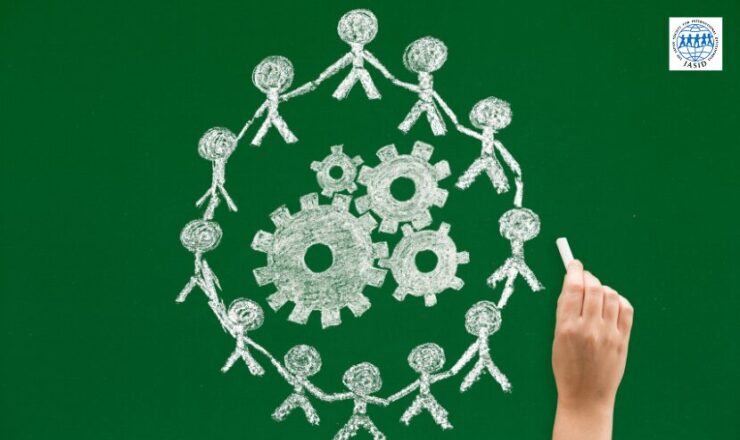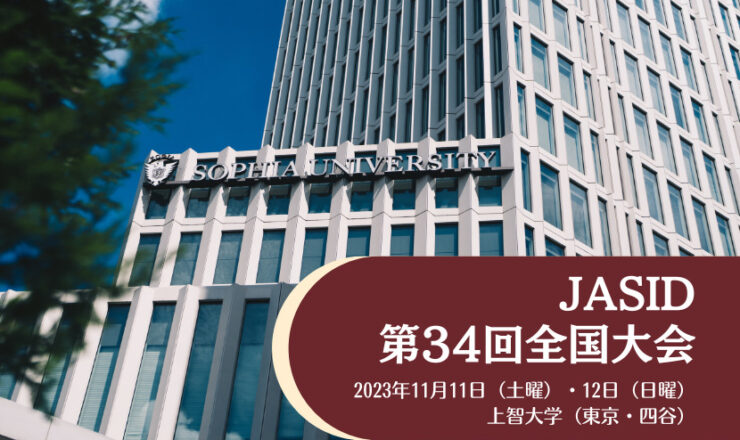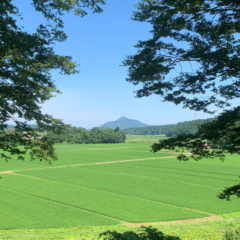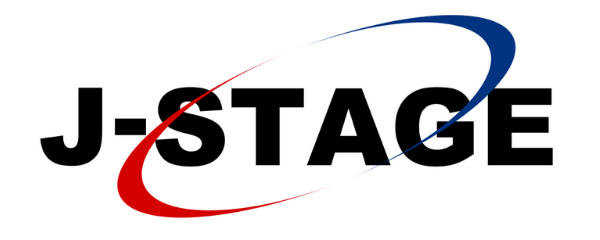The 26th Spring Conference of the Japan Society for International Development
The JASID Conference Organizing Committee cordially invites all members to the 26th Spring Conference to be held at Hokkido University on June 21-22, 2025. We welcome a wide range of presentations based on your research results. We also welcome applications for panel and roundtable sessions that are related to the conference theme. About the Conference Date: 2025 June 21-22 *Field excursion trips to be organized on June 22 (Sun) Conference venue: Institution for the...
25th JASID Spring Conference: Summary
Summary 25th JASID Spring Conference was held on 15 June (Saturday) at Utsunomiya University’s Mine Campus, Utsunomiya University), followed by an excursion on 16 June (Sunday). The theme was “Realizing International Cooperation and Interactive Co-creation in Local Context Global & Glocal Human Resource Development.” This event focused on the practical aspects of international cooperation and co-creation, with an emphasis on both global and local (glocal) human resource development. At Utsunomiya University, we are practicing...
Planning and Management
Overall planning and management Members YAMADA, Shoko (Chair) MATSUMOTO, Satoru OGUNI, Kazuko JASID Reasonable Accommodation Working Group (WG) YAMAGATA, Tatsufumi (Chair) OGUNI, Kazuko KAWAGUCHI, Jun DOBASHI, Yoshito MORI, Soya JASID Talent Recommendation Working Group (WG) ITO, Sanae (Chair) TAKAHASHI, Motoki YAMAGATA, Tatsufumi
JASID Reasonable Accommodation Working Group
JASID encourages all its members to participate actively and freely in any societal activity. Along with this policy, JASID shall follow the reasonable accommodations in line with the United Nations Convention on the Rights of Persons with Disabilities. JASID established the “Reasonable Accommodation Policy of JASID,” (outlined below) based on which it provides sign language interpretation services and hires guides to assist the members with visual disabilities to travel to conferences. JASID Reasonable Accommodation...
Conference Organization
We plan and prepare for the conferences, supporting the organization committee of respective host institutions Members MATSUMOTO, Satoru (Chair) IKEMI, Mayu KURITA, Kyosuke OYAMA, Takatoshi WANG, Muyun President of JASID Vice President of JASID JASID Talent Recommendation WG (Programme)
Editorial Board
Members SHIMADA, Go (Chair) OBA, Asayo KATAYANAGI, Mari KAWAGUCHI, Jun SUGITA, Elli SATO, Kan YAMASAKI, Izumi AKIYOSHI, Megumi WANG, Muyun KUSAKABE, Tatsuya KUWAJIMA, Kyoko TOKUNAGA, Tatsumi NAGAMI, Kozo HANAOKA, Shinya FURUKAWA, Mitsuaki MICHINAKA, Maki
Social Co-Creation
Co-Chair Person KIMATA, Yoichiro SUGITA, Elli KUDO, Shogo Members SATO, Kan FUJIYAMA, Mayumi SAKAUE, Katsuki KONO, Keiko KOBAYASHI, Takaaki
Public Relations
Web, News Letter, Mailing List, … Members KANO, Tsuyoshi (Chair) TAKADA, Jun-ichi FUJIYAMA, Mayumi JIN, Masamitsu
JASID Prize Selection
JASID Prizes and Poster Presentation Awards The prize selection committee is in charge of evaluation and selection on the JASID Prizes and the Poster Presentation Awards. JASID Prizes are categorized into Grand Prize, Encouragement Prize, Journal Paper Prize and Committee Special Award. Grand Prize is awarded to the distinguished book or monograph; Journal Paper Prize is awarded to an excellent paper published in an academic journal on the field of international development including the...
Election Administration
Vote is your Voice The election for the director candidates is held every three years in the Japan Society of International Development. All members, including student members, have the right to vote. Next election will be held in May 2023. The primary mission of the Election Administration Committee is to prepare and manage the Society’s election to be conducted in a fair and smooth manner for our members. Corresponding to the new slogan of...
General Affairs
The Thankful Task of JASID activities The JASID’s general affairs commission tasks make the accounting materials (budget and settlement) and maintain regulations etc. In that sense, we can be said to be a commission that supports the activities of academic societies with JASID Secretariat. Members SEKIYA, Yuichi (Chair) IKEGAMI, Hiroshi HATSUKANO, Naomi
JASID Secretariat
Members HOSHINO, Akinari (Secretary General) OWA, Masumi SHIMAZU, Yuki For inquiries, please contact To contact the JASID Secretariat office, please use the form from the button below or send your inquiry to the following e-mail address. Contact Form Email Addresses hq [at] jasid.org jasid.org [at] gmail.com (replace [at] with @) Business Hours Tuesdays and Fridays (closed during long vacations) Postal Address JASID Secretariat c/o Institute of Developing Economies Japan External Trade Organization (JETRO) 3-2-2...
Measures to support JASID members with children who plan to attend the spring and annual meetings
The Japan Society for International Development (JASID) wishes to promote vigorous research activities by members with diverse backgrounds and needs. Based on this principle, we accept members to enter session rooms with children to make presentations or to participate in discussion, on condition that due efforts are made not to interfere with the progress of the session significantly. In order to create an enabling environment for members raising children, at each of the spring...
[3rd Announcement] The 25th JASID Spring Conference: Extension of Deadline for Application of Membership and Presentation
In light of the delay in sending out the 2nd newsletter regarding the 25th JASID Spring Conference scheduled for June 15, we have extended the deadline for new member applications to March 7 (Thursday), and the deadline for submission of presentation applications has also been extended to March 25 (Mon). With these adjusted deadlines, new members can still have the opportunity to apply for membership in time to participate in presentation. Application period: 16...
JASID 25th Spring Conference: Announcement of the start of registration for presentations
[JASID conference] 25th Spring Conference of the Japan Society for International Development: Announcement of the start of registration for presentations. The 25th Spring Conference website is now open. Conference HP: https://confit.atlas.jp/guide/event/jasid2024spring/static/greeting We have started accepting presentation proposals. As in previous years, we welcome proposals for three types of presentations: (1) oral presentations, (2) poster presentations, and (3) special sessions/roundtables. Please find below detailed information regarding each of these presentation types. The language of presentation...
The 25th JASID Spring Conference
Realizing International Cooperation and Interactive Co-creation in Local Context; Global & Glocal Human Resource Development We are excited to announce the 25th Spring Conference of the Japan Society for International Development (JASID), scheduled to be held at Utsunomiya University in Tochigi Prefecture. The theme is “Realizing International Cooperation and Interactive Co-creation in Local Context Global & Glocal Human Resource Development.” This event will focus on the practical aspects of international cooperation and co-creation, with...
[RG24-4] Genealogy of Development Discourses
It has been more than 30 years since the establishment of the Japan Society for International Development (JASID). During this period, the global agenda regarding foreign aid has undergone significant transformations, the motivations driving donor countries to provide foreign assistance have shifted, and the domestic social challenges faced by donor countries have also evolved. JASID cannot remain unaffected by these changes in the academic and social landscape. The objective of this study group is...
[JASID conference] 34th JASID Annual Conference: Conference Program Booklet
We are just a week away from the annual conference. We look forward to welcoming everyone on campus. On the day of the conference, there is scheduled construction within the campus, and several events are expected to take place. It may cause some inconvenience due to the limited campus space, but we appreciate your understanding. We have created a conference program booklet. Please download and make use of it. Please also find some important...
The 34th JASID Annual Conference: Program release and participation in plenary session
We have released the online conference program, which includes the timetable, presentation abstracts, and presentation papers, available through Confit (conference portal). Additionally, we have compiled information about how to participate in the plenary session scheduled for the first day of the conference. Please take a moment to review this information. 1. Conference program (Confit) You can access the program via the conference website. To view and download the PDF papers, you will need a...
Procedures for Verifying Eligibility of Student Members for FY2024 [D/L: 17th Sep.]
Continuation or Change of Membership Type for 2024 For Student Members Each year in August/September, we conduct a confirmation of eligibility as a student member for the upcoming year. Student members who fall under any of the following categories must submit proof (such as a copy of their student ID card) that they are still a student on or after October 1 during the following application period by following the procedures below. Student members...
Reinstatement application for FY2024 [D/L: 17th Sep.]
To JASID members on leave of absence who wish to resume our activities The JASID members who are currently on a leave of absence and wish to resume our activities from the fiscal year 2024, which will begin in October 2023, are requested to notify us within the application period. Application Period Tuesday, August 15, 2023 – Sunday, September 17, 2023 * Deadline to be strictly observed How to apply Please complete the following...
Receipt of applications for recess in FY 2024 [D/L: 17th Sep.]
JASID has introduced a leave of absence system starting in FY 2023. This system allows full members and student members to take a leave of absence for up to four consecutive years. During the period of suspension, member services will be suspended, the sending of the journal and ML will cease, and applications and presentations at the conference will not be possible. In addition, the right to be elected and to vote in the...
Notice of Application for Dues Reduction for FY 2024 [D/L: 17th Sep.]
We are pleased to announce that we will continue to offer our members reduced annual membership fee for the FY 2024, which begins on October 1, 2024. This reduction is only applicable to regular and student members who have applied for this reduction program and have been approved by the Executive Board. Members who wish to reduce their annual membership fee for the FY 2024 (from Oct. 2023 to Sep. 2024) must apply to...
Q: Designate an overseas destination for postal items
Answer If you would like mail from JASID to be sent abroad, please go to your “My Page” and change your address. You will need to devise a method of stating this. A) Sent to my overseas affiliation address Do NOT enter the information of your institution address, even if you are mailing to your institution. Please provide the following information in English in the Home> Address > Address field. -Name -Name of your...
The 34th JASID Annual Conference: Announcement of the start of registration for presentations [2nd Announcement]
The 34th Annual Conference website is now open! Conference HP: https://confit.atlas.jp/guide/event/jasid2023annual/top?lang=en We have started accepting presentation proposals. As in previous years, we welcome proposals for three types of presentations: (1) oral presentations, (2) poster presentations, and (3) special sessions/roundtables. Please find below detailed information regarding each of these presentation types. The language of presentation should be either Japanese or English. ★Proposal submission period: 5 July (Wed) – 5 August (Sat), 2023 (1) Oral presentation...
“Resilience Seminar #41” Jan. 26 [for Members and Generals]
The Resilience seminar cordially invite you to join the following hybrid seminar. For zoom participation, prior registration is required here. https://kyoto-u-edu.zoom.us/meeting/register/tZcrf-iopj8vEt3qjR7X8JozVocIOWAF6ufP https://sites.google.com/view/aes-kyotonre/reselience-seminar Resilience Seminar #41 Date & Time: January 26, 2023, Thu 16:30-18:15 JST Language: English Venue: Seminar Room E220, Graduate School of Agriculture, Kyoto University and Zoom Web Seminar (hybrid) Speaker Masanori Matsuura, Institute of Developing Economies (IDE-JETRO) Title Weather Shocks, Livelihood Diversification, and Household Food Security: Empirical Evidence from Rural Bangladesh Abstract...
Kyoto Environment and Development Seminar #17 April 20 [for Members and Generals]
The Kyoto Environment and Development Seminar cordially invite you to join the hybrid seminar. Kyoto Environment and Development Seminar #19-20 Date & Time: May 25, 2023, Thursday, 15:00-18:15 (JST) Language: English Venue: Seminar Room E217 (GSA, Kyoto University) / Zoom Web Seminar Speaker: Takeshi Sakurai (University of Tokyo) and John Gibson (University of Waikato) Register in advance for this meeting: https://kyoto-u-edu.zoom.us/meeting/register/tZ0rduGtrTkoGt0W1uegmHccCJz7FR_cnegr After registering, you will receive a confirmation email containing information about joining the...
Kyoto Environment and Development Seminar #17 April 20 [for Members and Generals]
The Kyoto Environment and Development Seminar cordially invite you to join the hybrid seminar. Kyoto Environment and Development Seminar #19-20 Date & Time: May 25, 2023, Thursday, 15:00-18:15 (JST) Language: English Venue: Seminar Room E217 (GSA, Kyoto University) / Zoom Web Seminar Speaker: Takeshi Sakurai (University of Tokyo) and John Gibson (University of Waikato) Register in advance for this meeting: https://kyoto-u-edu.zoom.us/meeting/register/tZ0rduGtrTkoGt0W1uegmHccCJz7FR_cnegr After registering, you will receive a confirmation email containing information about joining the...
Q: I haven’t received my postal parcel.
A: The journal is sent by “Kuroneko Mail” from the Journal Publication Centre. All other mail is sent via the post office. The following are some of the most common causes of non-delivery of postal items. Address description was incomplete. Please register the full address notation, including the room number, on your “My Page” for the mailing address. A great deal of mail is returned because there is no room number in the address....
Q:How to request information to be sent out on the mailing list
Answer 学会員の研究活動に有益な情報を、一斉配信でお送りする「メーリングリスト」を行なっています。この配信依頼サービスは、在会中の会員限定で承っております。 メーリングリスト配信依頼 以下のフォームに必要事項をご記入のうえ、広報委員会までご依頼ください。 なお、フォームへの送信完了から配信まで、最大1週間程度お時間をいただいております(ウェブサイトへの掲載は、更にそれ以降となります)。 直近のイベント告知は間に合わないこともございますので、前もってご依頼ください。 メーリングリスト配信依頼フォーム 配信原稿作成についての注意点 HTMLメール(リンクの埋め込みやフォントの変更など)は使えません 絵文字は使えません。(入力があった場合は空白として取り扱います) 広報委員会では問い合わせに対応できませんので、必ず【問い合わせ連絡先】を配信原稿にご記載ください(冒頭でご記入いただくメールアドレスは広報委員会の管理用となり、配信内容には含まれません) 実際MLで配信される記事のレイアウトが崩れる恐れがあるため、本フォームの横幅を意識した文章の折り返し(改行)はしないでください。(メモ帳などでドラフト作成後、コピー&ペーストしていただくことを推奨いたします) また、インデントには全角スペースをご利用ください 重複する内容の告知やリマインダーとしての【再配信】は行っておりません。尚、原稿内容の訂正が必要な場合は、本フォームにて修正原稿を作成の上、項番「9.特記事項」に修正部分を明記してください。元原稿の配信状況により、差し替えまたは「修正版」として配信致します 配信原稿に日文と英文がある場合、同一の配信依頼フォームにてご依頼ください。尚、実際に配信される記事は各会員の言語登録状況によりどちらか一つのみになります




















![社会課題解決のための開発とイノベーション [FY2022-]](https://jasid.org/wp/wp-content/uploads/2021/11/eye-Solving-Social-Problems-240x240.png)





